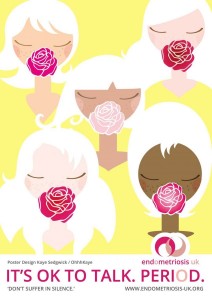Endometriosis UK share “Women and young girls are waiting an average of two years before consulting their GP about difficult or painful periods. The Diagnosis Survey by Endometriosis UK found that women and young girls do not realise that what they are suffering may not be normal and that they should consult a healthcare professional.
Painful, heavy, difficult or irregular periods can be a sign of an undiagnosed medical condition, including endometriosis. Young women – particularly – need to be encouraged to seek help at an early stage. If they do so they may significantly increase their ability to conceive later in life and will not necessarily have to suffer symptoms for years for which they could have help. Average diagnosis times for endometriosis still sit at around seven years with 50% of women diagnosed reporting their first symptoms in their teenage years.
That’s why we say in our new campaign that: It’s ok to talk. Period.
Whilst many women experience some pain or discomfort during their period, specifically in the early years, no-one should be experiencing pain that lasts for more than two days. If a period affects everyday activities or cannot be controlled by normal over-the-counter pain medication, then women are encouraged to seek help. Painful periods, especially so if accompanied by other symptoms, may need additional treatment. Early diagnosis has been shown to improve health outcomes for many conditions.
Just talking about what is normal can be helpful. Many women have learned about periods from their mothers, sisters or aunts, but as some conditions (e.g. endometriosis) have a genetic factor, then symptoms can become normalised. To help start the conversation, Endometriosis UK is setting up a range of activities to encourage women to talk: online, by telephone and face-to-face.
Helen North, Chief Executive of Endometriosis UK, says: “Women must be more aware of the devastating effects that painful periods can have upon them at an earlier stage. Our recent research indicating delays in both seeking help and diagnosis times for endometriosis, suggests that both women and healthcare professionals need to be much more aware that endometriosis is a possibility. With over 1.5 million women suffering with endometriosis in the UK, it is almost scandalous that they wait an average of seven years for diagnosis. Associated with delayed diagnosis, the costs to the NHS are thought to be as much as £8 billion. Women simply must be encouraged to seek help as soon as they can.”
Leaflets and information to give more information about endometriosis and the symptoms to look out for can be found on the Endometriosis UK website – www.endometriosis-uk.org – with a Pain and Symptom Diary available to download, plus many other useful leaflets. There is also a telephone helpline where people can phone in and discuss their symptoms – see the website for opening times.
Activities to raise awareness about endometriosis continue after Awareness Week, with an event in the Scottish Parliament on Wednesday 12th March – entitled: ‘Endometriosis: the hidden threat to women’s health’ – and on 13th March in Kensington Gardens, London, in support of the global campaign: ‘Million Woman March for Endometriosis.’
For full information on all the activities and more about Endometriosis, visit www.endometriosis-uk.org. ”
